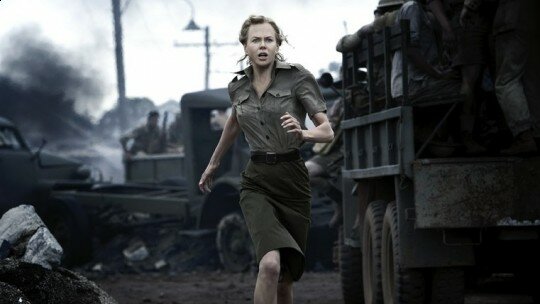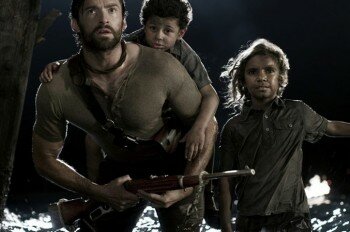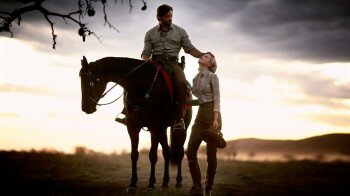Review by Anders. (See page 2 for Katina’s review)
It’s a bold and unusual move to name a film after an entire country. Considering that no feature length film since 1923 has been simply titled “America”, maybe there is a good reason why it’s not a common occurrence. Sure, the entire film subsequently acts as a giant advertisement for the country that millions will actually pay to see, but if the film completely bombs or even slightly falls short of expectations, its failure could potentially be forever associated with the nation. The stakes are raised even further when you consider that Australia is the nation and film in question. With the economy deep in recession and the nearly non-existent film industry floundering, the nation desperately needs the film Australia to be a national and international success. When you have Oscar nominated auteur Baz Lurhmann behind the camera and Oscar winning actress Nicole Kidman in front of it, you’d be inclined to think it’s a safe gamble to make as well.
But has it paid off? Well, kind of…
On the verge of the Second World War, Lady Sarah Ashley (Nicole Kidman) travels to Australia in an attempt to get her husband, the owner of a cattle station a few days south of Darwin, to sell the ranch to cattle baron King Carney (Bryan Brown). Instructed by her husband to meet and take Lady Ashley to the ranch is “Drover” (Hugh Jackman), a brazen cattle drover whom is frequently ridiculed by the white Europeans due to his association with the Aboriginal population. Particularly around this time, Indigenous Australians were socially exiled as it was considered that their bloodline was impure. Caught in the middle of the racial injustice is “half-cast” Nullah (Brandon Walters), a local Aboriginal boy hiding from the police, as they were tasked at the time with forcibly removing mixed-blood children from their families and placing them in church missions. When Lady Ashley arrives to find that cattle station manager Neil Fletcher (David Wenham) has been secretly jeopardizing the value of the property, she calls off the sale and hires the help of Drover to deliver the cattle to Darwin before Carney can seal a deal with the Army to be the sole provider of meat to the Australian forces fighting overseas. Meanwhile, the Japanese forces responsible for the devastating attacks on Pearl Harbor set their sights on Darwin and ready their historic attack.
Hugh Jackman and Brandon Walters (right) steal the show.
As the synopsis above makes abundantly clear, Australia has a lot of stories to tell. Unfortunately, even with a 3 hour running time, Luhrmann ultimately tries to tell too much. As a result, each subplot feels half-baked; the depiction of the stolen generation is fairly shallow, the characters mostly underdeveloped and the Darwin bombings appear somewhat like an afterthought. That’s not to say that what is depicted is not competently done. On the contrary, I found myself thoroughly engaged throughout the film regardless of the long runtime and the rather classical story. Despite it being the jerky merger of what could easily be broken into multiple films, Australia still manages to strike an even balance between spectacular action and captivating drama. Yet I never felt totally satisfied by the many points Luhrmann was trying to make. The problem primarily comes down to a screenplay that overextends its reach. If anything, Luhrmann wasn’t given enough time to adequately explore each subplot. Considering that the entire runtime of acclaimed Australian film Rabbit Proof Fence was required to provide a solid portrayal of the Stolen Generation, it’s easy to see how also trying to depict a cattle drive, the bombing of Darwin and a blossoming romance is biting off more than one can chew.
The shallow nature of Australia might be due to the fact that the stories told are clearly aimed towards a foreign audience. It’s hard to truly fault the film for predominantly coming across as a giant advertisement, because Hollywood has been doing so for years (How many times have we been force fed the concept of the American Dream?). For instance, the reoccurring motif of the Wizard of Oz provides international audiences a familiar concept to latch onto. Yet certain scenes felt too contrived, as though they were inserted simply to showcase the Australian outback, which served only to occasionally withdraw my engrossment in the story. Certain stereotypical character traits also jarred my attention, such as the overuse of the term “Crickey” that unwillingly draws upon memories of the late Steve Irwin and his blatantly overstated stereotype of Australian people. Regardless of its gaudy nature, the film does manage to spark a sense of national pride. Mandy Walker’s cinematography has given life to the vast Australian landscape, wondrously coming to life with sweeping camera pans and gorgeous backdrops. Australia, even in its most barren locations, is a beautiful country and Luhrmann has certainly made sure that the rest of the world knows it. If Australia is to see any Oscar recognition, it’s going to be from its cinematography.
Australia is wonderfully shot.
Pride also arises from the all Australian cast, most of whom are superb. Hugh Jackman is tremendous as the Drover, oozing charisma as the believable love interest and ultimately embodies a character most Australians would no doubt be proud to have representing themselves. Whilst Nicole Kidman’s portrayal of the English aristocrat Sarah Ashley initially comes across as overly garish, she manages to fall well into place as the film takes its stride at the twenty minute mark. As it happens, the romance that transpires between the two star leads is both captivating and convincing. Yet it’s the young Aboriginal boy Brandon Walters who steals the show as Nullah, the half-cast Lady Ashley takes under her wing. Walters turns in a truly heart-warming performance, one that might even warrant award recognition, and is subsequently the film’s most developed character. This is noteworthy considering many of the characters, despite being well portrayed, are oddly underdeveloped. The film does little to divulge the motivations behind antagonist Neil Fletcher, who, without faulting David Wenham’s enjoyable performance, seems to be nasty for the sheer sake of it. Even the romantic leads appear as though they only came into existence when the cameras started rolling, as the audience is told little about their past and how it has defined who they are in the present. When you consider how long they spend onscreen, it is a flaw that isn’t easily overlooked.
If you’re familiar with his past works, you’ll understand what I mean when I say that the biggest character of Australia is its director. Luhrmann, clearly taking a step back from the overt theatrical style that defined his Red Curtain trilogy, still manages to leaves his mark on Australia. The rapid editing, extreme close-ups and speedy pull focuses are still frequently used by the auteur, particularly in the opening 20 minutes. Even the extravagant ball that takes place has an uncanny resemblance to the scene where Romeo and Juliet first sight each other in Luhrmann’s 1996 take on the Shakespearean classic. Whilst his style still makes for a joyous ride, it’s certainly not as well suited as it has been in the past given the less theatrical setting. Nevertheless, Luhrmann’s passion for filmmaking has never been more apparent.
Conclusion:
Whilst it’s not the masterpiece we so desperately wanted it to be, Australia still manages to be a good time at the cinema. Maybe if the film didn’t try too hard to be the all encompassing Australian story, instead focusing on a few less of the sum of its parts, it might not have come across as disjointed and superficial as it ultimately has. Still, Luhrmann’s exciting directorial style along with the high production values and strong cast makes Australia a significant film worthy of its bold title.
 Follow the author Anders Wotzke on Twitter.
Follow the author Anders Wotzke on Twitter.
















